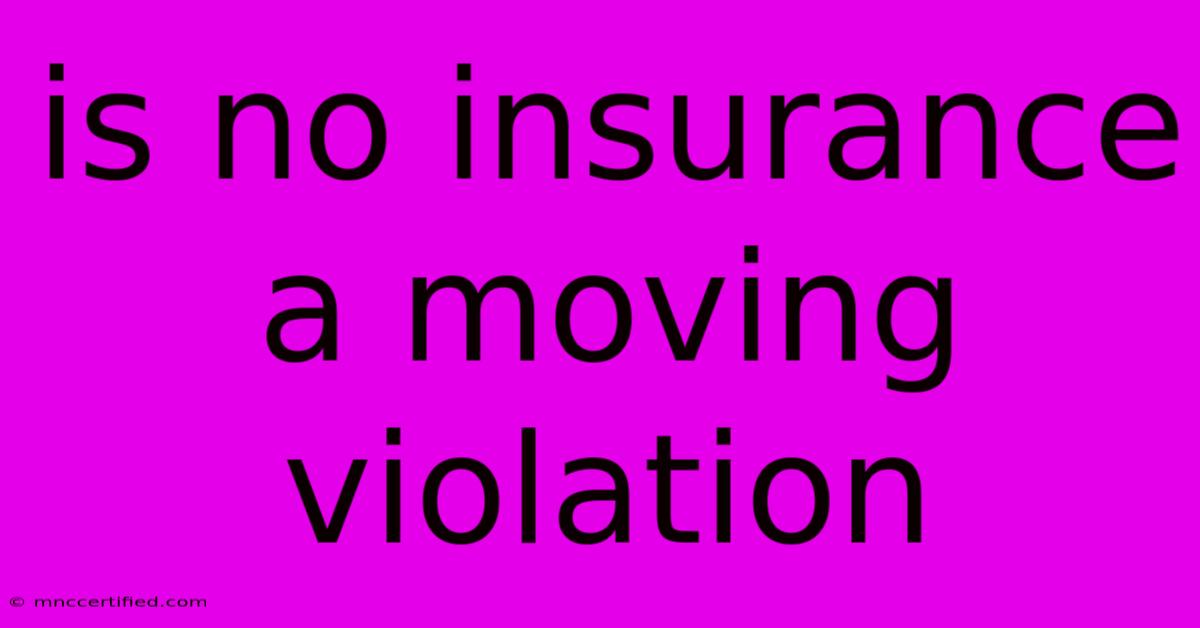Is No Insurance A Moving Violation

Table of Contents
Is No Insurance a Moving Violation? A Comprehensive Guide
Driving without insurance is a serious offense, but is it considered a moving violation? The short answer is: no, not directly. However, the consequences are significant and often intertwined with other potential moving violations. Let's break it down.
Understanding the Difference: Moving vs. Non-Moving Violations
Before we dive into the specifics of driving without insurance, it's crucial to understand the distinction between moving and non-moving violations.
-
Moving Violations: These involve a violation of traffic laws while the vehicle is in motion. Examples include speeding, running a red light, reckless driving, and driving under the influence (DUI). Points are typically added to your driving record, leading to potential increases in insurance premiums and even license suspension.
-
Non-Moving Violations: These are violations that occur when the vehicle is not in motion. Examples include expired registration, parking violations, and, importantly for our discussion, driving without insurance. While these don't usually result in points on your license, they still carry significant penalties.
Why Driving Without Insurance Isn't a Moving Violation
Driving without insurance is classified as a non-moving violation because it doesn't inherently involve the movement of the vehicle. The offense is committed regardless of whether the car is parked or in operation. The act of driving without insurance is the violation, not the act of driving itself.
The Serious Consequences of Driving Uninsured
While not a moving violation, the penalties for driving without insurance are substantial and can vary by state. These can include:
- Fines: Expect significant fines, which can be considerably higher than those for many moving violations.
- License Suspension or Revocation: Your driving privileges can be suspended or revoked, preventing you from legally operating a vehicle.
- Vehicle Impoundment: Your vehicle may be impounded until proof of insurance is provided.
- Increased Insurance Premiums: Even after you obtain insurance, expect significantly higher premiums for years to come, reflecting the increased risk you represent to insurers.
- Court Costs: You'll likely face court fees and potentially legal representation costs.
- Jail Time: In some jurisdictions, repeat offenders or those involved in accidents while uninsured could face jail time.
The Interplay with Other Moving Violations
While not a moving violation itself, driving without insurance frequently intersects with other moving violations. For example:
- If you're pulled over for speeding or another moving violation, the lack of insurance will be an additional offense. This can amplify the penalties significantly.
- In the event of an accident, driving without insurance adds another layer of legal and financial repercussions. You could be held personally liable for all damages, potentially facing substantial costs and lawsuits.
How to Avoid Driving Without Insurance
The best way to avoid the penalties associated with driving without insurance is to maintain continuous and valid auto insurance coverage. Shop around for competitive rates, ensure you understand your policy, and make timely payments.
Key Takeaways
Driving without insurance is a serious offense, though technically a non-moving violation. The consequences, however, are far-reaching and can be far more severe than many moving violations. Avoid the substantial fines, license suspensions, and potential legal battles by ensuring you have adequate insurance coverage at all times. Your wallet, your driving record, and your future self will thank you.

Thank you for visiting our website wich cover about Is No Insurance A Moving Violation. We hope the information provided has been useful to you. Feel free to contact us if you have any questions or need further assistance. See you next time and dont miss to bookmark.
Featured Posts
-
Post Surgery Update Davina Mc Call
Nov 16, 2024
-
Mavs Struggle Wembanyama Shines Le Brons Numbers Soar
Nov 16, 2024
-
Stallone Compares Trump To Washington
Nov 16, 2024
-
Le Brons Stats Wembanyamas Impact Mavs Face Challenges
Nov 16, 2024
-
Trump Gains Support Sylvester Stallone Weighs In
Nov 16, 2024